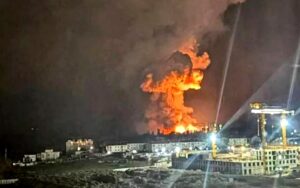Syrian Ministry of Energy: Syria needs $30 billion to rebuild its energy sector and raise gas production

After more than a decade of war and sanctions, Syria faces an enormous challenge in rebuilding the energy sector, which is one of the pillars of the national economy.
The Syrian Ministry of Energy revealed that the country needs more than $30 billion to rehabilitate the oil, electricity, minerals and water sectors, noting that the electricity sector alone requires about $10 billion to repair power plants, transmission lines, and distribution networks.
During the World Energy Summit in Abu Dhabi, Ahmed Suleiman, director of communications at the Syrian Ministry of Energy, stated that the scale of the destruction in energy infrastructure is huge, stressing that Syria is seeking to attract major international investments to participate in reconstruction projects.
Suleiman explained that the ministry’s delegation, headed by Minister Eng. Mohammed al Bashir, held a session entitled “The Future of Energy in Syria”, with the participation of companies from the UAE, Saudi Arabia, Qatar, the United States and Europe, and many of them showed an actual willingness to enter into reconstruction projects.
He indicated that the Syrian electricity network was damaged by more than 70%, while the operational capacity decreased by more than 75%.
Oil production has fallen from 380,000 barrels per day before 2011 to just about 120,000 barrels today, while gas production has fallen from 8.9 million cubic meters per day to about 7 million cubic meters.
The ministry seeks to raise production to 22 million cubic meters per day to meet the needs of generating plants, as part of a plan that includes rehabilitating more than 2,500 oil wells and raising production to 400,000 barrels per day, in addition to restarting the Arab Gas and Kirkuk-Baniyas lines and linking them with Jordan and Türkiye.
The ministry also announced new agreements with an international consortium led by Qatar’s Urbacon to build and operate 8 power plants with a capacity of 5000 megawatts, in addition to renewable energy projects worth $7 billion, including gas and solar plants.
Despite these efforts, Suleiman stressed that the funding gap is still large, noting that the World Bank’s $146 million grant represents a positive step but remains limited compared to the size of the challenge.
He added that the lifting of US sanctions on the energy sector last June helped open the doors to international cooperation, as Syria witnessed the export of the first official oil shipment in 14 years through the port of Tartus.
With the acceleration of government plans and new investment projects, Syria appears to be steadily moving toward regaining its position as a regional energy hub in the Eastern Mediterranean, at a time when the battle for reconstruction is still ongoing on more than one front.







